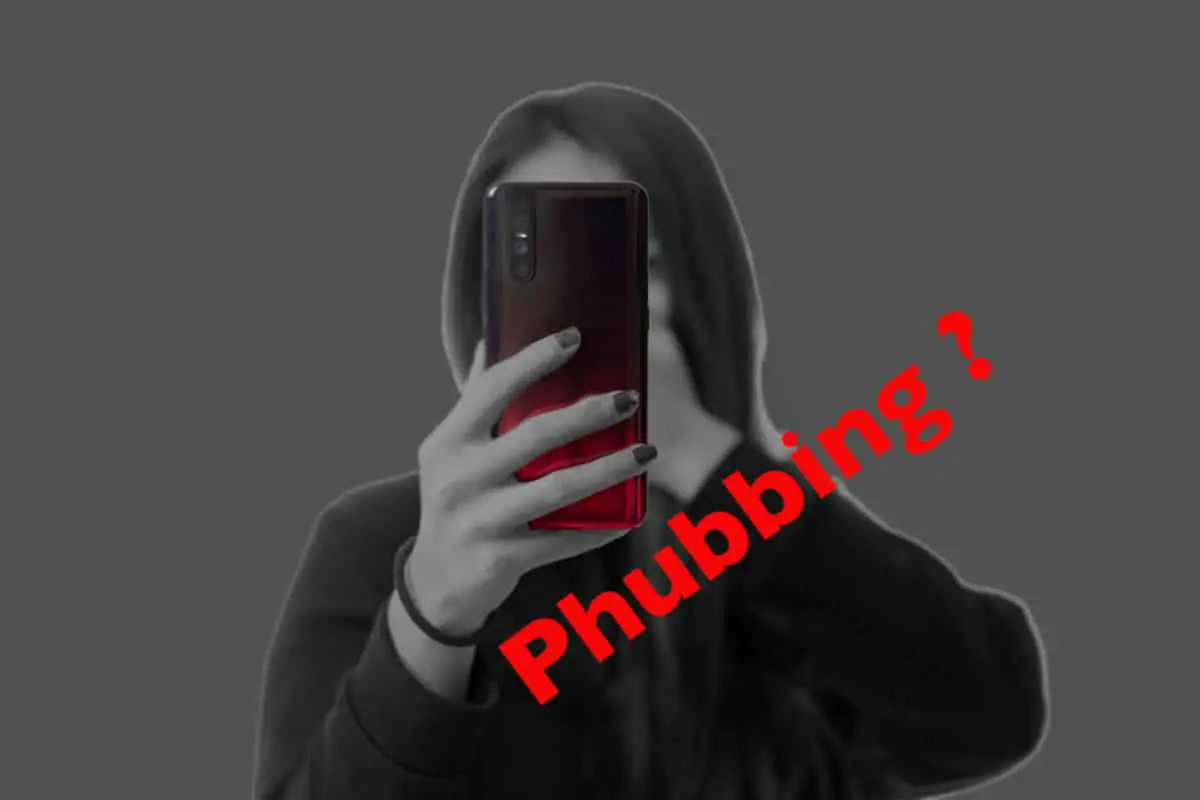We’ve all seen it, and we’ve probably all done it. Quickly pulling out your phone to look busy so you can avoid eye contact or maybe an awkward conversation.
For some people smartphones have a shield to hide behind to block, avoid, or escape human interaction. I actually find myself doing this more than I care to admit.
There’s definitely a time and place where “cell phone blocking” can come in handy. For example, avoiding that one creepy dude or maybe your mother-in-law.
But with millions of people worldwide blocking human interaction on a daily basis, are there any consequences? Does it only affect individuals or are their larger long term consequences on a societal level?
Is our global society becoming generally more withdrawn? Or are we just connecting in different ways ?
Let’s Dive In !
Hiding Behind Your Phone: What The Heck Is “Phubbing”
You probably haven’t heard the term phubbing before? I though it had something to do with the 90’s movie Flubber at first, but the concept of ‘phubbing’ (as dumb as the word sounds) is nothing new that we haven’t see before.
Phubbing is a mashup of phone and snubbing, basically phone snubbing.Body language experts call this “blocking”. In 2016 the psychology department at the University of Kent in the UK did a study to find out how common ““phubbing”” really is.
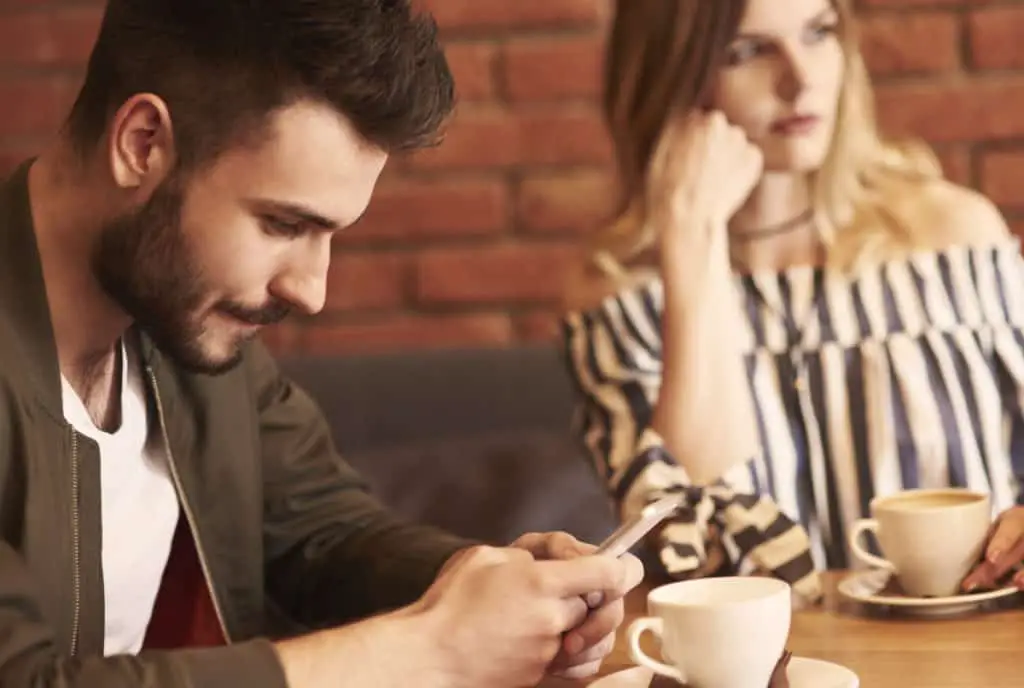
The study found that 26% of people use their phone to block other people 2-3 times a day. Matching that data, 31% of people reported BEING blocked 2-3 times a day.
Before smartphones, if you wanted to ignore or block someone, you’d have to listen to their boring small talk for 2-3 minutes before telling them you have to go. As a predominantly introverted person myself, I often dread small talk.
However there are some massive benefits that come with taking the time to connect.
Career confidence coach, and writer for Forbes Magazine, Julia Wuench agrees that small talk is annoying, but that its small, and comes with massive benefits.
Small talk improves listening skills, helps us build muscles to overcome social discomfort, helps us find common ground, and lays the groundwork for deeper more psychologically stimulating conversations.
The Harvard Business Review wrote an article showcasing the merits of increased conversation and decreased phone use. They found that those more likely to engage in conversations had larger business networks, less feelings of isolation, and worked more productively.
Have Smartphones Killed The Art Of Conversation?
With so many people hiding behind their smart-phone screens, effectively blocking or “phubbing”, have our social skills started to lapse?
Are we losing the ability and the art of conversation?
Or are we just connecting in different ways than ever before?
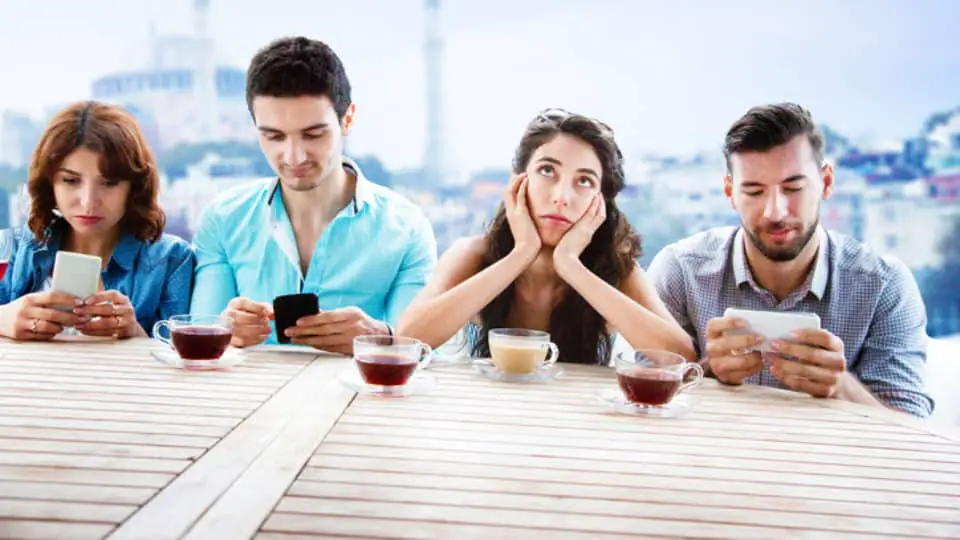
According to the Guardian , “Talk isn’t dead. It’s just presented in ways that are to the point, quicker and easier to articulate. What we lose in tone we make up for in emoji.”
This is definitely true to a degree…
But do emoji’s really make up for “real life” person to person conversation, emotion, tone of voice, body language, micro-expressions, and connection?
Texting can be efficient for a lot of simple transactional conversations, but nuanced conversations over txt can be cumbersome, inefficient, and a lot can get lost in translation.
Txting friends on the couch is a great way of multitasking and joking around, but not a great way to have nuanced conversations to form new deep connections with people.
I’ve found that sometimes 45 minutes of e-mailing back and forth could have been avoided with a 5 minute conversation.
According to Author, MIT Professor, and Harvard PHD Sherry Turkle, dependency on smartphones is causing us to “lose our ability to have deeper, more spontaneous conversations with others, changing the nature of our social interactions in alarming ways.”
In Dr. Turkle’s latest book, she details that 89% of Americans took out their phone during their last social interaction, and 82% said that after taking out their phone it deteriorated the conversation they were in.
When asked if she had any thoughts on solutions for the future, Dr. Turkle suggests that maybe we should start allowing ourselves to have more “human moments” and accept that life is not a steady digital “feed”.
How Does Smart Phone Phubbing Affect Relationships?
How is smart phone blocking (so called “phubbing”) affecting your personal relationships?
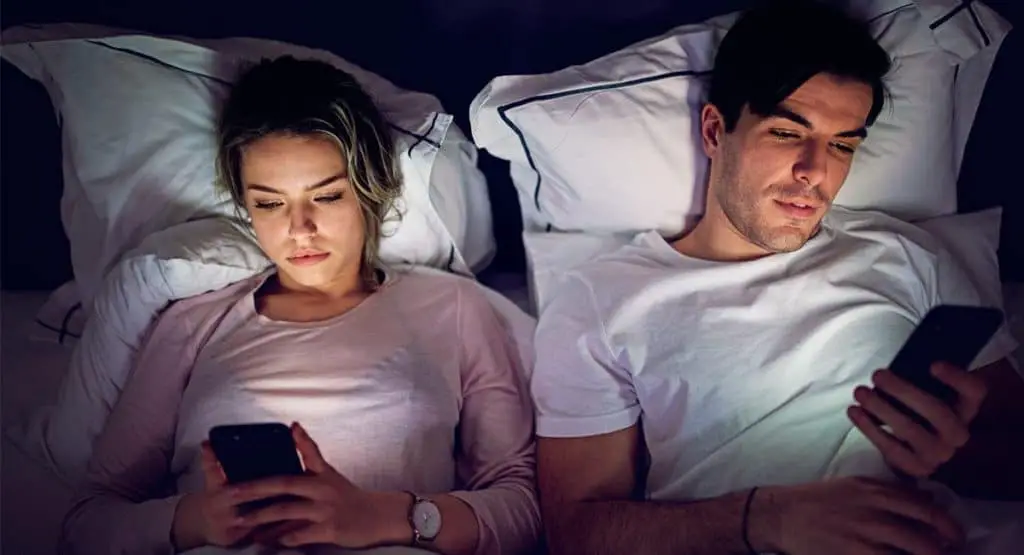
Have you ever pulled your phone out and started texting during the middle of a conversation? probably yeah. Or have you started talking to someone, and they pulled their phone out during the middle of a conversation? Also probably yeah.
Did the phone serve to deepen your connection during the conversation or weaken it? personally I’ve experienced both. Sometime showing someone a picture can help reinforce common understanding. But I’ve also felt disrespected when someone pulls a phone out and starts texting in the middle of a discussion. That person as “checked out” of the conversation.
Did you feel more connected or less connected? Probably less….According to Dr. Timothy J. Legg, PhD, PsyD
Pulling out your phone in the middle of a conversation “interrupts your ability to be present and engage with people around you.”
A study from China in 2017 found that partners in a relationship that “phub” each other have less relationship satisfaction and higher rates of depression.
Are We Too Dependent On Our Smartphones?
Probably yes, but ultimately it depends how you use it.
Having the internet in your pocket at all times is basically like being GOD a hundred years ago. Imagine having access to all the knowledge in the world at the tip of your fingers in the 1920’s. John Rockefeller would be bowing down to you.
With access to infinite knowledge there’s obviously a need and a huge benefit to having smartphones.
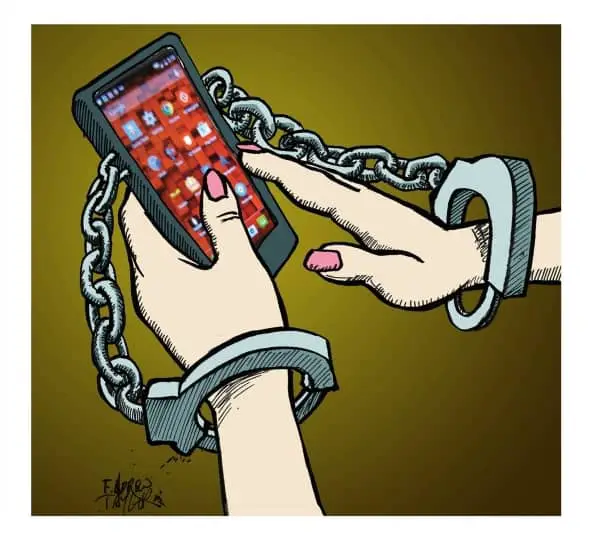
Still, with the infinite world of knowledge at our fingertips, millions of us use this technology mostly to post pictures of our meals and our cats. And to bow out of awkward social situations.
If you’re using your smartphone as a ‘crutch’ to help in social situations or to “kill time”, then those are not the best used of the god-like technology, and may even be signs of cell phone addiction.
here’s another article I wrote if you’re interested – 15 Reasons Why You May Be (probably are) Addicted To The Internet.
There’s a scary trend in the tech industry of employees leaving big companies and sounding the alarm about cell phone addiction.
Even tech leaders like Bill Gates, Steve Jobs (before he died), Snapchat founder Evan Spiegel, and Tim Cook make a point to limit cell phone usage for their own children.
Why would the creators of this technology, limit its use for their very own children? What do they know that we don’t?
Justin Rosenstein who was the Facebook Engineer that invented the “like” button says that technology is contributing toward so-called “continuous partial attention”. People are only able to give partial attention to everything they do which is severely limiting people’s ability to focus, and possibly even lowering IQ.
Basically, we need to make an effort to be more mindful of our cell phone and internet use.
A study by the University of Chicago found that the “mere presence” of smartphones with-in your vicinity, damages cognitive capacity – even when the device is turned off.
“Everyone is distracted,” Rosenstein says. “All of the time.”
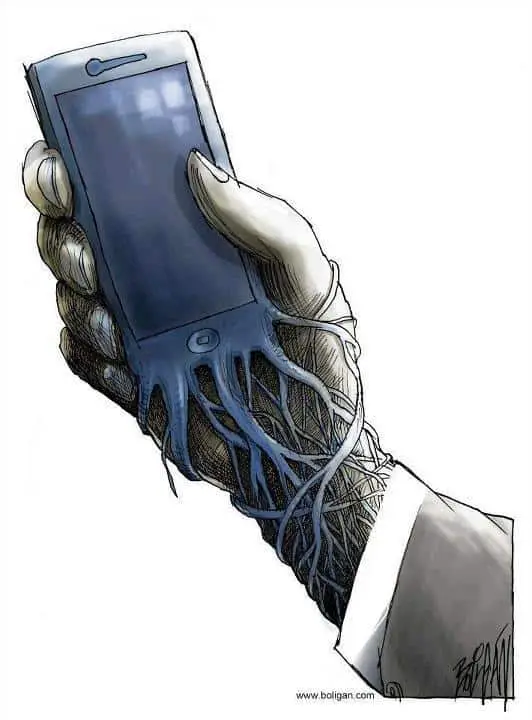
Why Are Humans So Vulnerable To The Allure Of The Cell Phone
last week I pulled out my phone to check the time, and before I knew it, I’d been scrolling on Instagram for 15 minutes.
How did I just get “sucked-in so easily?
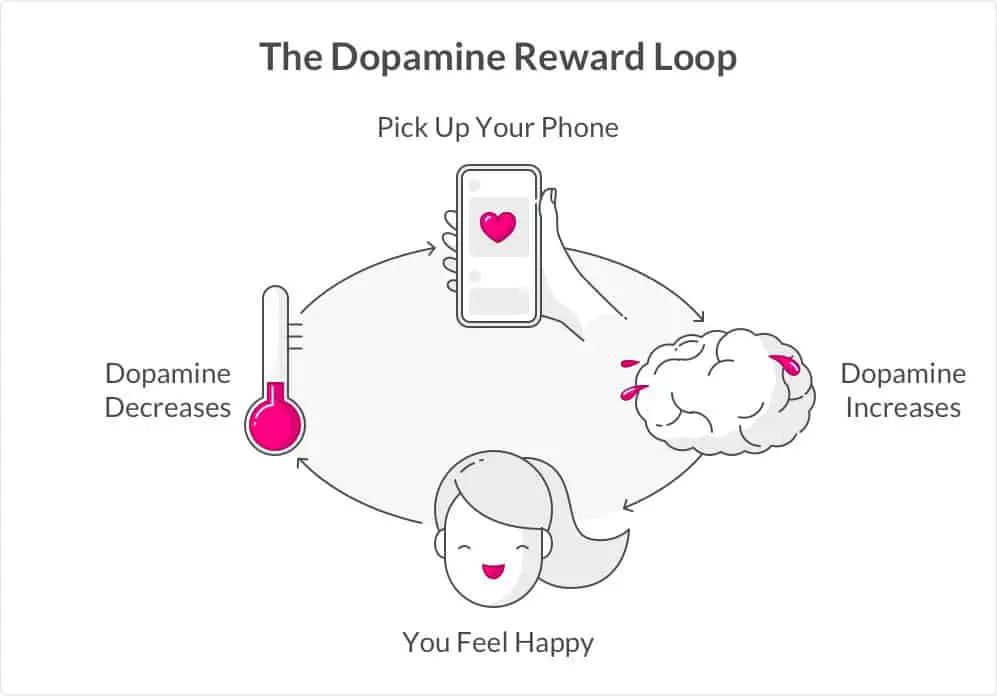
Professor Turkle’s research has found that the human brain is very susceptible to cell phones, and that we even get a neurochemical high from the constant stimulation that our phones give us.
She’s talking about dopamine, and according to experts, our brain gives off dopamine as a result of phone use.
Every time you get a notification, or a text, or see a friend on social media, your brain triggers a dopamine release (dopamine is the chemical in our brains that gives us a sense of pleasure).
Typically dopamine is naturally released after an achievement, or during sex, or after after drug use.
Cell phones full in the gaps in our daily lives.
Humans are hard wired to want connection and to be admired. But humans also don’t want to be vulnerable. Smartphones make sure that we never have to feel alone or bored. It gives us the option to feel busy, important, and to multitask at all times.
But filling in all of those gaps doesn’t give our brains as much time to rest, reflect or relax.
In short, smart phones, (and specifically certain apps), are designed to take advantage of human psychology.
We have the capability to overcome these dopamine triggers, but if we’re not aware of them in the first place then we’re working at a disadvantage.
Are You Addicted To Your Phone? 34 Characteristics of Someone Who Excessively Uses A Phone
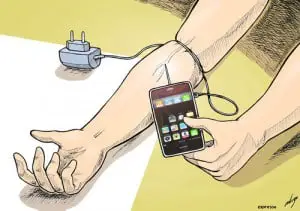
These are a collection of general characteristics that are displayed by people who are addicted to their phone, the internet, or social media.
You probably don’t ‘check all of these boxes’, but likely you’ll find a lot of these more relatable than maybe you care to admit.
- Do you find yourself spending more time on your smartphone than you realize?
- Do you find yourself mindlessly passing time on a regular basis by staring at your smartphone (even though there might be better or more productive things to do)?
- Do you seem to lose track of time when on your cell phone?
- Do you find yourself spending more time texting, tweeting, or emailing as opposed to talking to real-time people?
- Has the amount of time you spend on your cell phone been increasing?
- Do you secretly wish you could be a little less connected to your cell phone?
- Do you sleep with your smartphone on or under your pillow or next to your bed regularly?
- Do you find yourself viewing and answering texts, tweets, and emails at all hours of the day and night, even when it means interrupting other things you are doing?
- Do you text, email, tweet, or surf the internet while driving or doing other similar activities that require your focused attention and concentration?
- Do you feel your use of your cell phone actually decreases your productivity at times?
- Do you feel reluctant to be without your smartphone, even for a short time?
- When you leave the house, you ALWAYS have your smartphone with you and you feel ill-at-ease or uncomfortable when you accidentally leave your smartphone in the car or at home?
- When you eat meals, is your cell phone always part of the table place setting?
- When your phone rings, beeps, buzzes, do you feel an intense urge to check for texts, tweets, or emails, updates, etc.?
- Do you find yourself mindlessly checking your phone many times a day even when you know there is likely nothing new or important to see?
- Do you have trouble completing tasks at work or home.
- Do you find yourself Concealing your smartphone use.
- Do you feel phantom vibrations, even when you’re not getting texts.
- Do you reach for your phone the moment you’re alone or bored.
- Do you wake up multiple times at night to check your phone.
- Do you feel anxious, upset, or short-tempered when you can’t get to your phone.
- Has your phone use has caused you to have an accident or injury.
- Does your phone use interferes with your job performance, schoolwork, or relationships.
- Are people in your life are concerned about your phone use patterns.
- When you try to limit your phone use, do you relapse quickly.
- Do you feeling uncomfortable around people
- Have you become clumsy at initiating conversations in person
- Do you struggle with conversations when multiple people are present
- Are you uneasy with eye contact
- Do you have trouble picking up on social or emotional cues from others
- Are you constantly ‘fidgety’ and constantly checking your phone
- Are you impatient with people if they are taking their time and speaking at length
- Do you get irritable if someone does not react immediately or as you expected
- Do you feel overwhelmed by the presence of people and often want to be alone
5 Ways To Reduce Phone Dependency(Breaking Your Brains Connection)
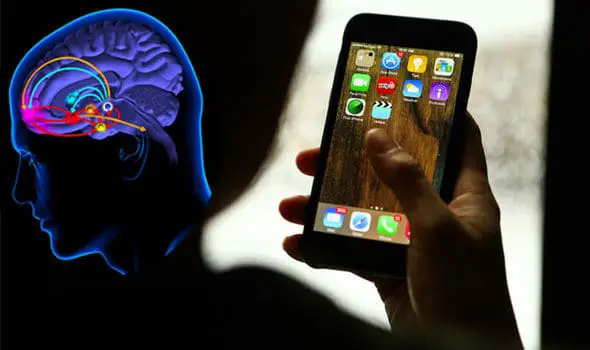
- Make Meals a “No-Phone Zone
It’s common courtesy to put your phone away when you’re eating. When sharing a meal at a table try talking like regular humans and save the phones until after the meal. Don’t be rude - Leave Your Phone Behind
If you’re someone who just can’t stay off their phone, try putting it in another room. Keep the temptation away from you. - Challenge Yourself
Make it a personal challenge to improve your phone habits. We were all thrust into a giant social experiment of what it would be like to be connected at all times. Ultimately it’s up to us to figure out how to stay sane and maintain social communication skills. - Turn Off Your Notifications
Turning off notifications is an easy way to un-train your brain from responding to beeps and vibrations. - Avoid Texting During Face-To-Face Conversations
Be aware that you’re being rude by not giving people your full attention. When it comes to face-to-face conversations keep your phone in your pocket.
For 38 More Tips On Using Social Media More Consciously Check Out This Post.
3 Ways To Help Someone Who uses Their Phone Too Much
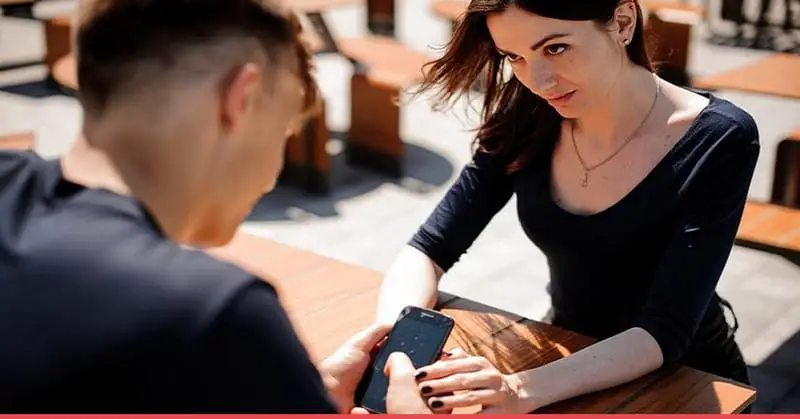
- Lead by Example
If your friends or family are “phubbers” set the tone and lead by example. Just because someone pulls their phone out, doesn’t mean that you have to pull yours out. Stay grounded. - Call Them Out
How you do this is up to you, but call people out if they’re phubbing you, or if they’re phubbing someone else. Ask if they’re ignoring you, or if you’re boring them, or just tell them that they’re being rude. - Be Sympathetic
Ultimately addictions are diseases. But addictions are usually caused by the desire to escape reality. Cell phone addiction is no different. Often phubbing is just a result of feeling uncomfortable, insecure, or unsure of how to handle a certain social situation.
Conclusion
The technology explosion of the internet, cell phones, and social media has been a giant social experiment over the last 10-15 years.
We’re only now starting to understand the results of a society that prefers texting over ‘real-time’ conversations. The effects of cell phone addition on a massive scale has yet to be understood, but that doesn’t mean we shouldn’t take a minutes to think about the global impacts as individuals.
Ultimately, the solution is awareness. If you’re not even aware there is a problem, then you have no chance of understanding or correcting behavior that may ultimately be counterproductive to society’s long term success.
It is also possible, that increased digital communication could be the beginning stages of a new era of human interaction that we as a society have yet to fully grasp the benefits of.
Let me know what you think about his topic.
Loved what you read?
Hit that share button and let the world in on the secret – we’d be thrilled!
Got thoughts? We’re all ears for your feedback, corrections, or a good old chat. Don’t be shy; drop us a line.
And hey, don’t miss out on our curated list of must-reads in the recommended books section.
Big thanks for diving in with us today!


